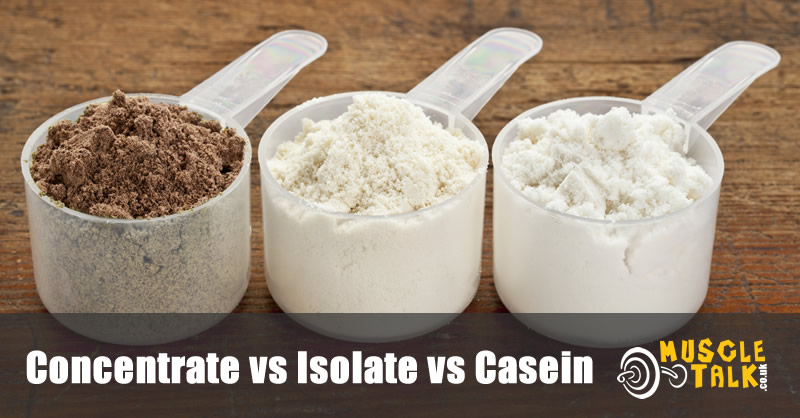Protein powders can be a great boost to your workout program, but each type of protein powder affects the body in different ways. Protein powders are commonly used to encourage muscular development, aiding in protein synthesis for muscle repair and growth. It is very important that you understand the reasons for choosing a particular type of protein powder. Protein powders come in three main types: whey protein concentrate, whey protein isolate and casein protein.

Each type has its own benefits and drawbacks, so make sure you understand your training goals and needs before making your choice.
Protein Synthesis & Protein Breakdown
Muscular development is a process of breaking down muscle proteins during training and encouraging protein synthesis to repair and build muscle. Stress placed on the muscles during workouts causes muscle protein breakdown, known as muscle catabolism. Muscles consume protein during catabolism. In order for new muscle to develop, the body must consume more synthesized protein than it consumes during catabolism. The goal of muscular development is to limit the amount of muscle protein lost during training while maximizing the amount of protein synthesis following training. Protein powders are a good way to optimize this process.
Whey Protein
Whey is an excellent source of protein, not only because of its high protein count, but also because of its high biological value (BV). Whey is a milk by-product extracted during the curdling process when making cheese. Whey proteins make up around 20% of the protein contained in milk, while casein protein makes up the remaining 80%. Whey protein is an excellent source of amino acids, containing all nine essential amino acids. This means that whey protein is a complete protein source, delivering all the necessary amino acids that stimulate protein synthesis and muscle growth.
Whey Protein Concentrate
Whey protein concentrate is made by filtering milk through a process that allows water, minerals, and other organic materials to be separated, leaving a concentrated protein powder behind. Whey protein concentrate contains about 70-85% protein and as much as 5% lactose. Because of the comparatively high percentage of lactose in whey protein concentrate, those with lactose intolerance often have difficulty digesting it. Another consideration with whey protein concentrate is the presence of fat and lactose, which can be beneficial for people that want to build mass as well as muscle, but in terms of building strictly lean muscle, whey protein isolate is a step up.
Whey Protein Isolate
After a process of intense filtration, whey isolate reaches upwards of 90% or more protein. And with the same BV as whey protein concentrate, isolate is considered by some to be the best source for lean muscle-promoting proteins. Another benefit of whey protein isolate is its low-calorie count. Whereas concentrated whey contains fat and lactose, whey protein isolate contains minimal amounts of fat and lactose. This not only makes it easily digestible by lactose-intolerant people, but also for developing lean muscle.
Casein Protein
As I said before, developing new muscle is about two things: protein synthesis and protein breakdown. Building new muscle requires breaking them down, then building them up again. The function of casein protein is to limit the amount of muscle tissue lost during catabolism (muscle breakdown). Also known as a muscle-sparing protein, casein is not a fast digestion and absorption protein. During the filtration process that separates whey protein from the curds that make cheese, the curd is casein protein. And when you ingest casein protein powder, it congeals in your gut and is gradually absorbed over an extended period of time. Since casein protein is absorbed slowly into the bloodstream, its effects on protein synthesis (building new muscle) are minimal. But in terms of overall muscular development, casein protein is very effective at limiting the amount of muscle tissue lost during protein breakdown. Many people use casein protein before going to sleep, as it delivers a sustained release of muscle-saving proteins throughout the night.
In my experience, not enough people do the crucial research that would not only improve their training effectiveness but would also save them money. Sports nutrition supplements aren’t getting any cheaper, and to really get your monies worth, it’s important that you don’t just scoop up protein powders all willy-nilly. You must first understand your training goals, then evaluate whether a protein powder will advance those goals. Once you’ve assessed your training and nutritional needs, then – and only then – should you choose the right protein powder for the right purpose. Ask any tradesperson and they will tell you that nothing matters more than using the right tool for right job. Physical improvement is no different.
